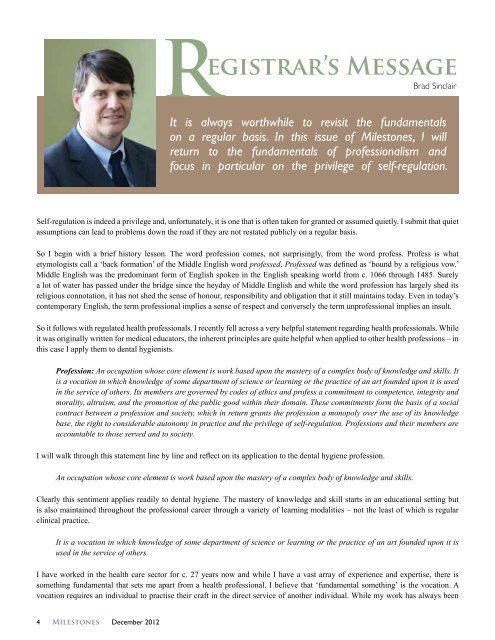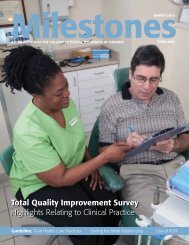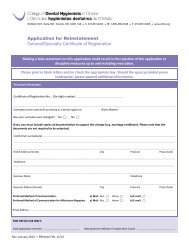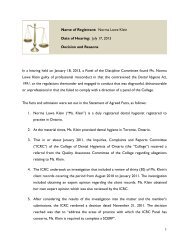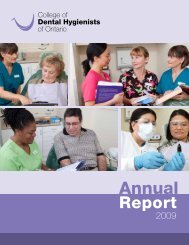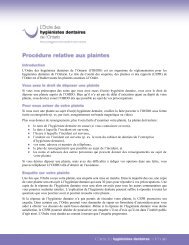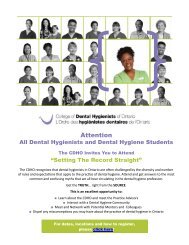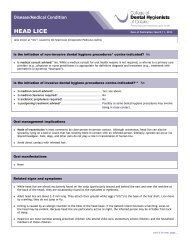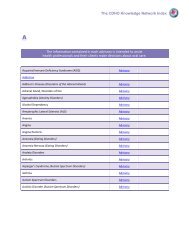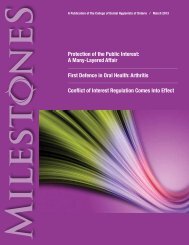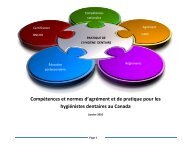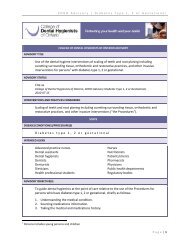December - College Of Dental Hygienists of Ontario
December - College Of Dental Hygienists of Ontario
December - College Of Dental Hygienists of Ontario
You also want an ePaper? Increase the reach of your titles
YUMPU automatically turns print PDFs into web optimized ePapers that Google loves.
Brad Sinclair<br />
It is always worthwhile to revisit the fundamentals<br />
on a regular basis. In this issue <strong>of</strong> Milestones, I will<br />
return to the fundamentals <strong>of</strong> pr<strong>of</strong>essionalism and<br />
focus in particular on the privilege <strong>of</strong> self-regulation.<br />
Self-regulation is indeed a privilege and, unfortunately, it is one that is <strong>of</strong>ten taken for granted or assumed quietly. I submit that quiet<br />
assumptions can lead to problems down the road if they are not restated publicly on a regular basis.<br />
So I begin with a brief history lesson. The word pr<strong>of</strong>ession comes, not surprisingly, from the word pr<strong>of</strong>ess. Pr<strong>of</strong>ess is what<br />
etymologists call a ‘back formation’ <strong>of</strong> the Middle English word pr<strong>of</strong>essed. Pr<strong>of</strong>essed was defined as ‘bound by a religious vow.’<br />
Middle English was the predominant form <strong>of</strong> English spoken in the English speaking world from c. 1066 through 1485. Surely<br />
a lot <strong>of</strong> water has passed under the bridge since the heyday <strong>of</strong> Middle English and while the word pr<strong>of</strong>ession has largely shed its<br />
religious connotation, it has not shed the sense <strong>of</strong> honour, responsibility and obligation that it still maintains today. Even in today’s<br />
contemporary English, the term pr<strong>of</strong>essional implies a sense <strong>of</strong> respect and conversely the term unpr<strong>of</strong>essional implies an insult.<br />
So it follows with regulated health pr<strong>of</strong>essionals. I recently fell across a very helpful statement regarding health pr<strong>of</strong>essionals. While<br />
it was originally written for medical educators, the inherent principles are quite helpful when applied to other health pr<strong>of</strong>essions – in<br />
this case I apply them to dental hygienists.<br />
Pr<strong>of</strong>ession: An occupation whose core element is work based upon the mastery <strong>of</strong> a complex body <strong>of</strong> knowledge and skills. It<br />
is a vocation in which knowledge <strong>of</strong> some department <strong>of</strong> science or learning or the practice <strong>of</strong> an art founded upon it is used<br />
in the service <strong>of</strong> others. Its members are governed by codes <strong>of</strong> ethics and pr<strong>of</strong>ess a commitment to competence, integrity and<br />
morality, altruism, and the promotion <strong>of</strong> the public good within their domain. These commitments form the basis <strong>of</strong> a social<br />
contract between a pr<strong>of</strong>ession and society, which in return grants the pr<strong>of</strong>ession a monopoly over the use <strong>of</strong> its knowledge<br />
base, the right to considerable autonomy in practice and the privilege <strong>of</strong> self-regulation. Pr<strong>of</strong>essions and their members are<br />
accountable to those served and to society.<br />
I will walk through this statement line by line and reflect on its application to the dental hygiene pr<strong>of</strong>ession.<br />
An occupation whose core element is work based upon the mastery <strong>of</strong> a complex body <strong>of</strong> knowledge and skills.<br />
Clearly this sentiment applies readily to dental hygiene. The mastery <strong>of</strong> knowledge and skill starts in an educational setting but<br />
is also maintained throughout the pr<strong>of</strong>essional career through a variety <strong>of</strong> learning modalities – not the least <strong>of</strong> which is regular<br />
clinical practice.<br />
It is a vocation in which knowledge <strong>of</strong> some department <strong>of</strong> science or learning or the practice <strong>of</strong> an art founded upon it is<br />
used in the service <strong>of</strong> others.<br />
I have worked in the health care sector for c. 27 years now and while I have a vast array <strong>of</strong> experience and expertise, there is<br />
something fundamental that sets me apart from a health pr<strong>of</strong>essional. I believe that ‘fundamental something’ is the vocation. A<br />
vocation requires an individual to practise their craft in the direct service <strong>of</strong> another individual. While my work has always been<br />
4 Milestones <strong>December</strong> 2012


